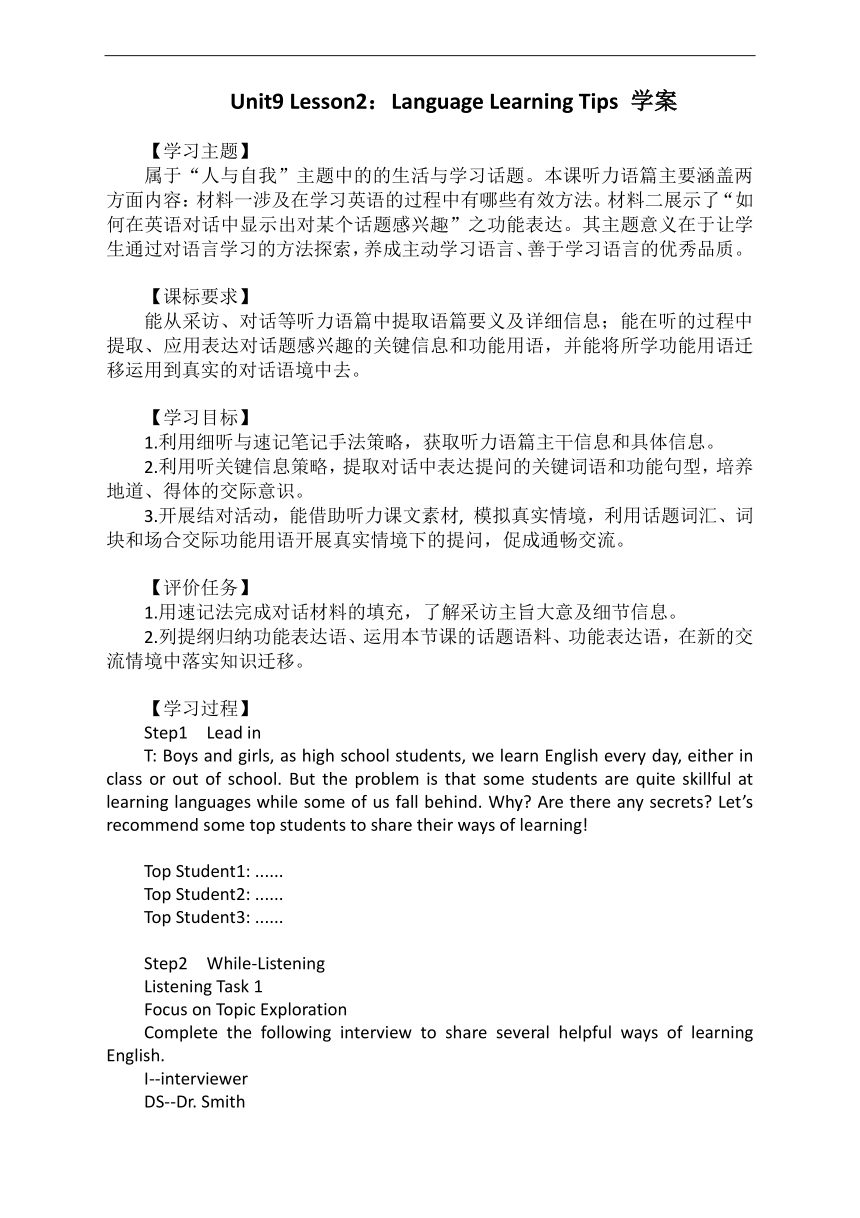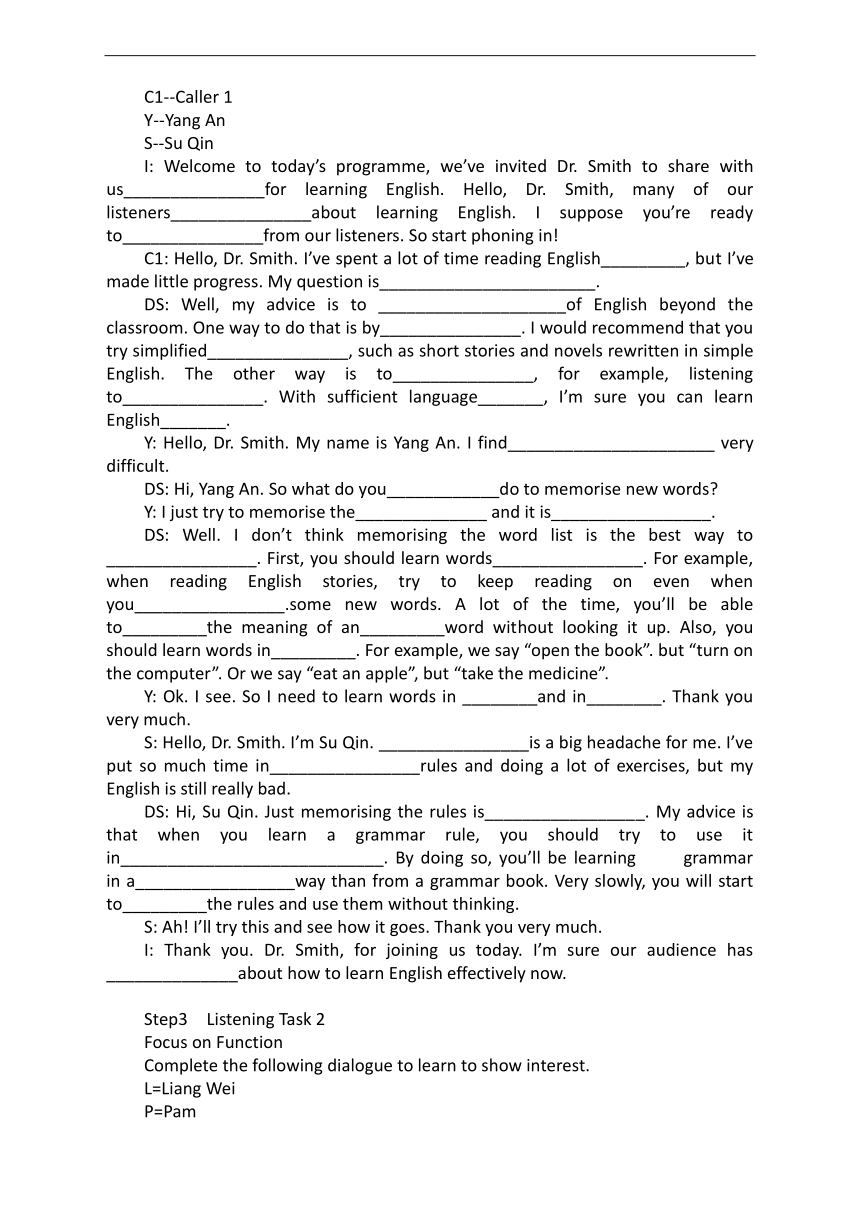北师大版(2019)必修第三册Unit 9 Learning Lesson 2 Language Learning Tips 学案(无答案)
文档属性
| 名称 | 北师大版(2019)必修第三册Unit 9 Learning Lesson 2 Language Learning Tips 学案(无答案) |

|
|
| 格式 | docx | ||
| 文件大小 | 17.7KB | ||
| 资源类型 | 教案 | ||
| 版本资源 | 北师大版(2019) | ||
| 科目 | 英语 | ||
| 更新时间 | 2024-02-24 00:00:00 | ||
图片预览


文档简介
Unit9 Lesson2:Language Learning Tips 学案
【学习主题】
属于“人与自我”主题中的的生活与学习话题。本课听力语篇主要涵盖两方面内容:材料一涉及在学习英语的过程中有哪些有效方法。材料二展示了“如何在英语对话中显示出对某个话题感兴趣”之功能表达。其主题意义在于让学生通过对语言学习的方法探索,养成主动学习语言、善于学习语言的优秀品质。
【课标要求】
能从采访、对话等听力语篇中提取语篇要义及详细信息;能在听的过程中提取、应用表达对话题感兴趣的关键信息和功能用语,并能将所学功能用语迁移运用到真实的对话语境中去。
【学习目标】
1.利用细听与速记笔记手法策略,获取听力语篇主干信息和具体信息。
2.利用听关键信息策略,提取对话中表达提问的关键词语和功能句型,培养地道、得体的交际意识。
3.开展结对活动,能借助听力课文素材, 模拟真实情境,利用话题词汇、词块和场合交际功能用语开展真实情境下的提问,促成通畅交流。
【评价任务】
1.用速记法完成对话材料的填充,了解采访主旨大意及细节信息。
2.列提纲归纳功能表达语、运用本节课的话题语料、功能表达语,在新的交流情境中落实知识迁移。
【学习过程】
Step1 Lead in
T: Boys and girls, as high school students, we learn English every day, either in class or out of school. But the problem is that some students are quite skillful at learning languages while some of us fall behind. Why Are there any secrets Let’s recommend some top students to share their ways of learning!
Top Student1: ......
Top Student2: ......
Top Student3: ......
Step2 While-Listening
Listening Task 1
Focus on Topic Exploration
Complete the following interview to share several helpful ways of learning English.
I--interviewer
DS--Dr. Smith
C1--Caller 1
Y--Yang An
S--Su Qin
I: Welcome to today’s programme, we’ve invited Dr. Smith to share with us_______________for learning English. Hello, Dr. Smith, many of our listeners_______________about learning English. I suppose you’re ready to_______________from our listeners. So start phoning in!
C1: Hello, Dr. Smith. I’ve spent a lot of time reading English_________, but I’ve made little progress. My question is_______________________.
DS: Well, my advice is to ____________________of English beyond the classroom. One way to do that is by_______________. I would recommend that you try simplified_______________, such as short stories and novels rewritten in simple English. The other way is to_______________, for example, listening to_______________. With sufficient language_______, I’m sure you can learn English_______.
Y: Hello, Dr. Smith. My name is Yang An. I find______________________ very difficult.
DS: Hi, Yang An. So what do you____________do to memorise new words
Y: I just try to memorise the______________ and it is_________________.
DS: Well. I don’t think memorising the word list is the best way to ________________. First, you should learn words________________. For example, when reading English stories, try to keep reading on even when you________________.some new words. A lot of the time, you’ll be able to_________the meaning of an_________word without looking it up. Also, you should learn words in_________. For example, we say “open the book”. but “turn on the computer”. Or we say “eat an apple”, but “take the medicine”.
Y: Ok. I see. So I need to learn words in ________and in________. Thank you very much.
S: Hello, Dr. Smith. I’m Su Qin. ________________is a big headache for me. I’ve put so much time in________________rules and doing a lot of exercises, but my English is still really bad.
DS: Hi, Su Qin. Just memorising the rules is_________________. My advice is that when you learn a grammar rule, you should try to use it in____________________________. By doing so, you’ll be learning grammar in a_________________way than from a grammar book. Very slowly, you will start to_________the rules and use them without thinking.
S: Ah! I’ll try this and see how it goes. Thank you very much.
I: Thank you. Dr. Smith, for joining us today. I’m sure our audience has ______________about how to learn English effectively now.
Step3 Listening Task 2
Focus on Function
Complete the following dialogue to learn to show interest.
L=Liang Wei
P=Pam
R=Robert
L: English is spoken in many areas of the world, for example, the US, the UK, Australia and New Zealand. Therefore, the English language may be used__________________ from one country to another. English speakers in different areas may also have different______________. Today, we’re honored to have two______________with us to tell us about this.
P: Hey there!, I’m Pam from the US.
R: Hello, nice to meet you. I’m Robert, from the UK.
L: Nice to meet you, Pam and Robert. Can you tell the difference between American English and British English
P: Well, I’m American and Robert is British, so we have different ways of________words. For example, British say “water”and “tomato”but Americans saywater”and “tomato”!
L: That’s________. ___________________! They sound so different! Do they still mean the same thing
P: They do. Let me think of some other examples for you. Ah, I say “example”and “dancing in the classroom”, but Robert says......
S3: She is an________to all of us.
R:“Example”and “dancing in the classroom”.
L: ________! How do people understand each other when words are pronounced so differently
P: The more you listen, the easier to_______________.
R: Apart from pronunciation,we use different________for describing the same things. For example, we say “lift”but Americans say “________”. We say “football”and Americans say “________”.
L: ________!
R: Let me tell you a joke. In London, if you ask the local people, “Where is the nearest subway ”, you may end up in a restaurant! The American “subway”is called the “________”in the UK, or “the tube ”in London.
L: ________! I________________ that British and American English were so different!
P: Well, don’t worry. Though the are different in one way or another, people have no difficulty in understanding each other. There are other ways to communicate---________is a worldwide language!
R: That’s right.
Step4 Function Expression Extract
Extract the functional expressions from the materials above on showing interest in a conversation.
___________________________________
___________________________________
___________________________________
___________________________________
___________________________________
___________________________________
Step5 Post-listening
Pair Work
Act out a dialogue talking about the clubs that interest you at school(学校社团),you both talk about the excellent coach, the first-class equipment and wonderful performances and both of you respond with great interest.
Step6 Assignment
Finish the Exercises on the Bilingual Papers.
【学后反思】
◎Can you share some strategies for learning English well
◎ Have you grasped the listening skill to get down the specific information
【学习主题】
属于“人与自我”主题中的的生活与学习话题。本课听力语篇主要涵盖两方面内容:材料一涉及在学习英语的过程中有哪些有效方法。材料二展示了“如何在英语对话中显示出对某个话题感兴趣”之功能表达。其主题意义在于让学生通过对语言学习的方法探索,养成主动学习语言、善于学习语言的优秀品质。
【课标要求】
能从采访、对话等听力语篇中提取语篇要义及详细信息;能在听的过程中提取、应用表达对话题感兴趣的关键信息和功能用语,并能将所学功能用语迁移运用到真实的对话语境中去。
【学习目标】
1.利用细听与速记笔记手法策略,获取听力语篇主干信息和具体信息。
2.利用听关键信息策略,提取对话中表达提问的关键词语和功能句型,培养地道、得体的交际意识。
3.开展结对活动,能借助听力课文素材, 模拟真实情境,利用话题词汇、词块和场合交际功能用语开展真实情境下的提问,促成通畅交流。
【评价任务】
1.用速记法完成对话材料的填充,了解采访主旨大意及细节信息。
2.列提纲归纳功能表达语、运用本节课的话题语料、功能表达语,在新的交流情境中落实知识迁移。
【学习过程】
Step1 Lead in
T: Boys and girls, as high school students, we learn English every day, either in class or out of school. But the problem is that some students are quite skillful at learning languages while some of us fall behind. Why Are there any secrets Let’s recommend some top students to share their ways of learning!
Top Student1: ......
Top Student2: ......
Top Student3: ......
Step2 While-Listening
Listening Task 1
Focus on Topic Exploration
Complete the following interview to share several helpful ways of learning English.
I--interviewer
DS--Dr. Smith
C1--Caller 1
Y--Yang An
S--Su Qin
I: Welcome to today’s programme, we’ve invited Dr. Smith to share with us_______________for learning English. Hello, Dr. Smith, many of our listeners_______________about learning English. I suppose you’re ready to_______________from our listeners. So start phoning in!
C1: Hello, Dr. Smith. I’ve spent a lot of time reading English_________, but I’ve made little progress. My question is_______________________.
DS: Well, my advice is to ____________________of English beyond the classroom. One way to do that is by_______________. I would recommend that you try simplified_______________, such as short stories and novels rewritten in simple English. The other way is to_______________, for example, listening to_______________. With sufficient language_______, I’m sure you can learn English_______.
Y: Hello, Dr. Smith. My name is Yang An. I find______________________ very difficult.
DS: Hi, Yang An. So what do you____________do to memorise new words
Y: I just try to memorise the______________ and it is_________________.
DS: Well. I don’t think memorising the word list is the best way to ________________. First, you should learn words________________. For example, when reading English stories, try to keep reading on even when you________________.some new words. A lot of the time, you’ll be able to_________the meaning of an_________word without looking it up. Also, you should learn words in_________. For example, we say “open the book”. but “turn on the computer”. Or we say “eat an apple”, but “take the medicine”.
Y: Ok. I see. So I need to learn words in ________and in________. Thank you very much.
S: Hello, Dr. Smith. I’m Su Qin. ________________is a big headache for me. I’ve put so much time in________________rules and doing a lot of exercises, but my English is still really bad.
DS: Hi, Su Qin. Just memorising the rules is_________________. My advice is that when you learn a grammar rule, you should try to use it in____________________________. By doing so, you’ll be learning grammar in a_________________way than from a grammar book. Very slowly, you will start to_________the rules and use them without thinking.
S: Ah! I’ll try this and see how it goes. Thank you very much.
I: Thank you. Dr. Smith, for joining us today. I’m sure our audience has ______________about how to learn English effectively now.
Step3 Listening Task 2
Focus on Function
Complete the following dialogue to learn to show interest.
L=Liang Wei
P=Pam
R=Robert
L: English is spoken in many areas of the world, for example, the US, the UK, Australia and New Zealand. Therefore, the English language may be used__________________ from one country to another. English speakers in different areas may also have different______________. Today, we’re honored to have two______________with us to tell us about this.
P: Hey there!, I’m Pam from the US.
R: Hello, nice to meet you. I’m Robert, from the UK.
L: Nice to meet you, Pam and Robert. Can you tell the difference between American English and British English
P: Well, I’m American and Robert is British, so we have different ways of________words. For example, British say “water”and “tomato”but Americans saywater”and “tomato”!
L: That’s________. ___________________! They sound so different! Do they still mean the same thing
P: They do. Let me think of some other examples for you. Ah, I say “example”and “dancing in the classroom”, but Robert says......
S3: She is an________to all of us.
R:“Example”and “dancing in the classroom”.
L: ________! How do people understand each other when words are pronounced so differently
P: The more you listen, the easier to_______________.
R: Apart from pronunciation,we use different________for describing the same things. For example, we say “lift”but Americans say “________”. We say “football”and Americans say “________”.
L: ________!
R: Let me tell you a joke. In London, if you ask the local people, “Where is the nearest subway ”, you may end up in a restaurant! The American “subway”is called the “________”in the UK, or “the tube ”in London.
L: ________! I________________ that British and American English were so different!
P: Well, don’t worry. Though the are different in one way or another, people have no difficulty in understanding each other. There are other ways to communicate---________is a worldwide language!
R: That’s right.
Step4 Function Expression Extract
Extract the functional expressions from the materials above on showing interest in a conversation.
___________________________________
___________________________________
___________________________________
___________________________________
___________________________________
___________________________________
Step5 Post-listening
Pair Work
Act out a dialogue talking about the clubs that interest you at school(学校社团),you both talk about the excellent coach, the first-class equipment and wonderful performances and both of you respond with great interest.
Step6 Assignment
Finish the Exercises on the Bilingual Papers.
【学后反思】
◎Can you share some strategies for learning English well
◎ Have you grasped the listening skill to get down the specific information
同课章节目录
- Unit 7 Art
- Lesson 1 Masterpieces
- Lesson 2 Beijing Opera
- Lesson 3 A Musical Genius
- Unit 8 Green living
- Lesson 1 Roots and Shoots
- Lesson 2 Greening the Desert
- Lesson 3 "White Bikes" on the Road
- Unit 9 Learning
- Lesson 1 Active Learning
- Lesson 2 Language Learning Tips
- Lesson 3 The Secrets of Your Memory
